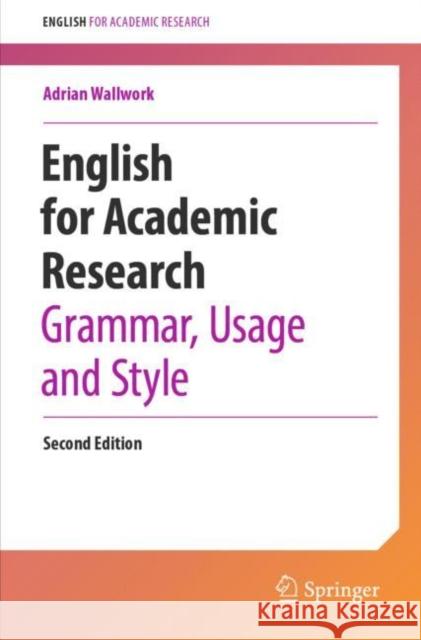English for Academic Research: Grammar, Usage and Style » książka
English for Academic Research: Grammar, Usage and Style
ISBN-13: 9783031315169 / Angielski
This guide draws on English-related errors from around 6000 papers written by non-native authors, 500 abstracts written by PhD students, and over 2000 hours of teaching researchers how to write and present research papers.This new edition has chapters on exploiting AI tools such as ChatGPT, Google Translate, and Reverso, for generating, paraphrasing, translating and correcting texts written in English. It also deals with contemporary issues such as the use of gender pronouns.Due to its focus on the specific errors that repeatedly appear in papers written by non-native authors, this manual is an ideal study guide for use in universities and research institutes. Such errors are related to the usage of articles, countable vs. uncountable nouns, tenses, modal verbs, active vs. passive form, relative clauses, infinitive vs.-ingform, the genitive, link words, quantifiers, word order, prepositions, acronyms, abbreviations, numbers and measurements, punctuation, and spelling.Other titles in this series:Grammar, Vocabulary, and Writing Exercises (three volumes)100 Tips to Avoid Mistakes in Academic Writing and PresentingEnglish for Writing Research PapersEnglish for Presentations at International ConferencesEnglish for Academic CorrespondenceEnglish for Interacting on CampusEnglish for Academic CVs, Resumes, and Online ProfilesEnglish for Academic Research: A Guide for TeachersAdrian Wallwork is the author of more than 40 English Language Teaching (ELT) and English for Academic Purposes (EAP) textbooks. He has trained several thousand PhD students and researchers from 50 countries to write papers and give presentations. He edits research manuscripts through his own proofreading and editing service.
This guide draws on English-related errors from around 6000 papers written by non-native authors, 500 abstracts written by PhD students, and over 2000 hours of teaching researchers how to write and present research papers. This new edition has chapters on exploiting AI tools such as ChatGPT, Google Translate, and Reverso, for generating, paraphrasing, translating and correcting texts written in English. It also deals with contemporary issues such as the use of gender pronouns.Due to its focus on the specific errors that repeatedly appear in papers written by non-native authors, this manual is an ideal study guide for use in universities and research institutes. Such errors are related to the usage of articles, countable vs. uncountable nouns, tenses, modal verbs, active vs. passive form, relative clauses, infinitive vs. -ing form, the genitive, link words, quantifiers, word order, prepositions, acronyms, abbreviations, numbers and measurements, punctuation, and spelling. Other titles in this series:Grammar, Vocabulary, and Writing Exercises (three volumes)100 Tips to Avoid Mistakes in Academic Writing and PresentingEnglish for Writing Research Papers English for Presentations at International ConferencesEnglish for Academic Correspondence English for Interacting on Campus English for Academic CVs, Resumes, and Online Profiles English for Academic Research: A Guide for Teachers Adrian Wallwork is the author of more than 40 English Language Teaching (ELT) and English for Academic Purposes (EAP) textbooks. He has trained several thousand PhD students and researchers from 50 countries to write papers and give presentations. He edits research manuscripts through his own proofreading and editing service.











